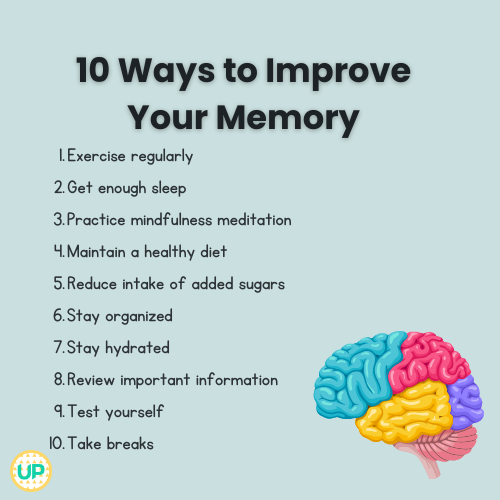Memory Improvement Techniques: Boost Your Brain Power
Memory is one of the most important cognitive functions we have. Whether you’re studying for exams, preparing for a big presentation at work, or simply trying to remember important events, improving your memory can help you live a more organized and successful life. In this article, we will explore various memory improvement techniques that are proven to enhance brain performance.

Why Memory Improvement Matters
Good memory plays a crucial role in everyday tasks. From remembering names to recalling information during a presentation, memory affects our personal, academic, and professional lives. The better your memory, the more efficiently you can complete tasks, manage your time, and solve problems.
Moreover, a sharp memory boosts self-confidence and reduces stress. If you can trust yourself to remember things without constant reminders, you’ll feel more in control of your life. Fortunately, memory can be improved at any stage in life with the right techniques.
1. Use Memory Techniques (Mnemonics)
Mnemonics are memory aids that help you remember complex information more easily. By associating what you need to remember with something more familiar or easier to recall, you can significantly enhance your retention.
Popular Mnemonic Techniques:
-
Acronyms: Create a word using the first letters of a group of words (e.g., ROYGBIV for the colors of the rainbow).
-
Visualization: Associate the information with vivid images. For example, if you’re trying to remember a list of items, imagine the items in a place you know well, like your home.
-
Chunking: Break down large pieces of information into smaller, manageable chunks. This is especially helpful for remembering phone numbers or long lists.
Using mnemonics taps into the brain’s ability to connect new information with existing knowledge, making it easier to recall.
2. Practice Mindfulness Meditation
Mindfulness meditation is a technique that involves focusing your attention on the present moment. Studies show that regular practice of mindfulness can improve memory by enhancing concentration and mental clarity.
How Mindfulness Helps:
-
Reduces Stress: Chronic stress can impair memory. Mindfulness helps calm the mind, which improves cognitive functions, including memory.
-
Improves Focus: Being present helps you concentrate better, which enhances the ability to retain and recall information.
-
Boosts Brain Plasticity: Mindfulness has been linked to changes in brain structure that improve memory and overall cognitive performance.
Consider setting aside a few minutes each day for meditation to boost your memory and overall mental health.

3. Get Enough Sleep
Sleep plays a critical role in memory consolidation. During sleep, the brain processes and stores information from the day, transferring short-term memories into long-term storage. Without adequate sleep, this process is compromised, leading to poor memory retention.
Tips for Better Sleep:
-
Establish a Routine: Go to bed and wake up at the same time every day to regulate your body’s internal clock.
-
Create a Relaxing Bedtime Ritual: Avoid screens and caffeine before bed. Instead, engage in relaxing activities like reading or listening to soothing music.
-
Ensure a Comfortable Sleep Environment: Make sure your bedroom is cool, dark, and quiet for optimal sleep quality.
Getting 7-9 hours of quality sleep each night can improve both your short-term and long-term memory.
4. Stay Physically Active
Physical exercise is not only good for the body but also for the brain. Regular physical activity has been shown to enhance brain function, increase memory retention, and improve overall cognitive abilities.
How Exercise Boosts Memory:
-
Increases Blood Flow: Exercise increases blood flow to the brain, delivering more oxygen and nutrients that enhance memory function.
-
Stimulates the Growth of New Brain Cells: Physical activity stimulates the growth of new neurons, which helps improve memory and learning.
-
Reduces Stress: Exercise releases endorphins, which reduce stress and improve mood, further supporting cognitive health.
Aim for at least 30 minutes of moderate exercise most days of the week to support your memory.
5. Eat Brain-Boosting Foods
What you eat can have a significant impact on your memory. Nutrients like omega-3 fatty acids, antioxidants, and vitamins are essential for brain health and memory improvement.
Brain-Boosting Foods:
-
Fatty Fish: Rich in omega-3s, which are crucial for brain function and memory.
-
Blueberries: Packed with antioxidants that protect the brain from oxidative stress and inflammation.
-
Leafy Greens: High in vitamins and minerals that support cognitive function.
-
Nuts and Seeds: Provide healthy fats and antioxidants that improve memory and brain health.
Incorporating these foods into your diet can help improve memory and cognitive function over time.
:max_bytes(150000):strip_icc()/great-ways-to-improve-your-memory-2795356-notext-final-ec993dd3d2cb40699d4df72547178ede.png)
6. Engage in Mental Exercises
Just like physical exercise strengthens the body, mental exercises help sharpen your memory and cognitive function. Regularly challenging your brain with puzzles, games, and new activities can keep your mind sharp.
Mental Exercises to Try:
-
Sudoku and Crosswords: These puzzles challenge your brain and improve problem-solving and memory retention.
-
Memory Games: Playing memory games can help strengthen recall and improve your ability to focus.
-
Learn New Skills: Picking up a new hobby or learning a new language can stimulate your brain and improve memory.
Engaging in these activities on a regular basis can help improve your memory and cognitive abilities.
7. Use Visualization Techniques
Visualization is a powerful memory improvement tool. By creating mental images of the information you want to remember, you engage both your visual and verbal memory systems, making it easier to recall.
How to Use Visualization:
-
Create a Mental Image: If you’re trying to remember a list of items, visualize each item in a familiar location (like your house).
-
Use the Method of Loci: This ancient technique involves associating information with specific locations along a route or in a place you know well.
-
Draw or Write It Out: Sketching or writing out information can also help reinforce memory by involving multiple senses.
Visualization helps reinforce connections in the brain, making it easier to recall information when needed.
FAQs About Memory Improvement
How long does it take to improve memory?
The time it takes to improve memory varies depending on the individual and the techniques used. However, with consistent practice, you may start noticing improvements within a few weeks.
Can memory loss be reversed?
In some cases, memory loss can be improved with lifestyle changes such as better sleep, physical activity, and mental exercises. However, in more severe cases, such as Alzheimer’s disease, professional treatment may be required.
Are there any supplements that can improve memory?
Some studies suggest that supplements like omega-3 fatty acids, ginkgo biloba, and Bacopa monnieri may support cognitive function and memory. However, it’s always best to consult a healthcare professional before starting any supplement regimen.
What are the best exercises for improving memory?
Exercises like crossword puzzles, sudoku, memory games, and learning new skills are great for improving memory. Regular physical exercise, such as walking or swimming, also has cognitive benefits.
Conclusion
Improving your memory doesn’t have to be a complicated or overwhelming process. By adopting a few simple techniques—such as using mnemonics, practicing mindfulness, getting enough sleep, staying active, and eating brain-boosting foods—you can enhance your memory and cognitive function. Remember, consistency is key. With regular practice, you’ll soon notice improvements in your ability to retain and recall information.
For more memory-boosting tips, check out our article on mindfulness techniques.










